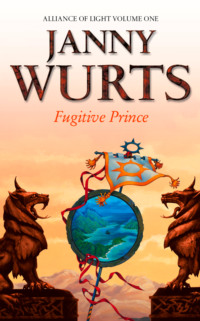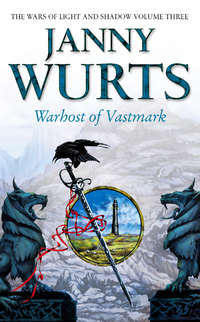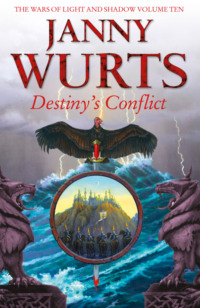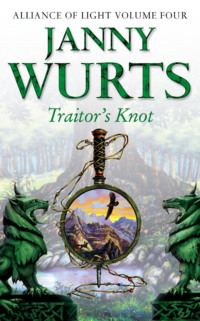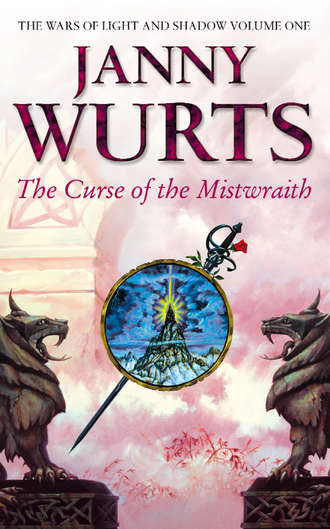
Полная версия
Curse of the Mistwraith
Morning came. Hunched against a wind that whined through tossing branches, the party passed into the foothills of Tornir Peaks. The great trees of Westwood thinned in concert with the soil, and the road wound between stripped, rock-crowned promontories sliced by stony gullies. Sleet had fallen during the night, and the slate paving was icy in patches, treacherous even at a walk. Arithon led his flighty dun by the bridle. Lysaer flanked him on foot, while Felirin took a turn in the chestnut’s saddle.
The cold and the cheerless landscape buoyed no one’s spirits, but Dakar’s irrepressible tongue stayed unaffected. ‘Damn you for a thief, Felirin, I swear you conspired against me to win that bet last night.’
The bard twisted back and checked the ties which secured his lyranthe to the saddle for the third time since he had mounted. Balked yet by Arithon’s reticence, his reply came back clipped. ‘Forget the bet. Just buy me an ale when we get to Erdane.’
‘Now there speaks a guilty man,’ the Mad Prophet pronounced. He kicked his paint forward and set the dun dancing as he drew alongside the Master. ‘Did the two of you plan to split the take?’
Jerked half off his feet as his mare skittered sideways, Arithon returned a quick laugh. ‘Why bother? As I remember, I needed no rigged wagers to part the silver from your belt.’
Reminded of his mishap in the alley in West End, Dakar turned purple. He bent over his saddlebow and spoke so that Felirin could not hear. ‘You’ll pay for that.’
‘You say?’ Arithon brought the dun under control by rubbing her ear to distract her. When she settled he slapped her fondly and added a remark concerning slipshod spells.
Dakar deflated in moody silence.
‘You’ve made a clam of him,’ Lysaer observed with a smile. ‘Thank Ath. My ears were tired.’
But the friendliness in the comment did not warm. Apart from the others, and keenly wishing an hour of solitude to sort through troubled thoughts, Arithon strode at the dun’s shoulder while a round of banter designed to bait Dakar developed between Felirin and Lysaer.
The party rounded a bend where the road snaked beneath an overhang, and the talk suddenly died. A driving clang of hoofbeats echoed down from the rise ahead. A horse approached through the mist at a headlong gallop that begged for a fatal fall. The bridleless chestnut flung up its nose and neighed.
‘Hold here!’ called Asandir.
The next instant, a riderless grey stallion thundered into view through the fog. He clattered downslope in lathered, wild-eyed terror, his reins flying, broken, from the bit rings. The smoke-dark mane was fouled and dripping blood. Dakar’s paint caught the scent first. It spun and tried to bolt. Arithon cursed with eloquent force and fought his shying dun; Lysaer stepped hurriedly to aid him.
Astride the quivering but obedient chestnut, Felirin recognized the martial style of the runaway animal’s tack. ‘Hey, that’s one of the horses from the caravan guard!’
Only the black that bore Asandir seemed immune to alarm. Under the sorcerer’s guidance it advanced in spell-wrought, nerveless calm, swung across the road and blocked the way. The riderless animal checked in a sliding scrabble of hooves, then stood with lifted tail, blowing hard and rolling white-rimmed eyes. Asandir dismounted, slowly. He held out his hand and spoke a word, and the frightened horse appeared to settle. Then, his own black left unattended, the sorcerer advanced and with perfect lack of ceremony captured the stallion’s bridle.
‘Maybe he should have a turn at Arithon’s dun,’ Lysaer suggested. But no one appeared to be listening.
Dakar had lost his impertinence and Felirin showed open alarm. As Asandir approached, leading both the black and the stallion, all could see a shallow, ragged gash in the animal’s neck. Deeper marks clawed through the seat of the saddle, and bloodstains marred the leather that had not been left by the horse.
‘Daelion Fatemaster,’ Lysaer swore. ‘What sort of predator caused that?’
‘You don’t want to hear,’ said Felirin. He raised his voice and called to Asandir. ‘There are Khadrim in the pass, yes?’
‘I fear so.’ The sorcerer halted the horses. With quick fingers he unbuckled the reins from the black’s bridle and hitched them to the caught stallion’s bit. Then he cut off the ends of the broken pair and offered the animal to the bard. ‘I want everyone mounted.’
The remark included Arithon, who looped his reins over the dun’s ears, while Felirin slid off Lysaer’s chestnut and accepted possession of the grey. The bard asked, and received permission to leave his lyranthe where it was; no sense in trusting a strange horse with an awkward and unaccustomed burden. ‘This was the guard captain’s mount,’ the bard said ruefully as he adjusted the leathers for his much longer legs. ‘This fellow is probably trained handily for war but damn, his saddle was made for a man with narrow buttocks. What little stuffing the Khadrim might have left has blown away on the wind.’
‘Sit down too hard on the armour studs and you’ll find yourself singing soprano,’ Dakar retorted smugly.
The bard shot him a dark look and dabbed at drying bloodstains before he set foot in the stirrup and mounted. ‘At the end of this day’s ride, I’ll be thankful to count only bruises.’ He settled his reins and addressed Asandir. ‘I presume we’re going to be crazy and continue on, not turn back?’
The sorcerer nodded. His gaze fixed on the half-brothers through a brief, measuring moment. ‘There could be danger, but the risk will stay manageable if nobody loses their head. Keep together, whatever happens. Arithon, when I tell you, and only when, draw your blade.’
The Mad Prophet slapped his forehead. ‘Ath!’
Asandir’s eyes went wide with incredulity. ‘Dakar! You scatterbrain, don’t tell me you’d forgotten the sword?’
‘I did.’ The Mad Prophet returned a pouting scowl. ‘Small wonder, with the rest of you conspiring to rig my bets.’
The sorcerer disgustedly turned and remounted his black. ‘Remind me never, ever, to rely on your memory in a pinch.’ He noticed and answered Arithon’s look without pause to turn his head. ‘Boy, your sword was forged ten and a half thousand years past, expressly for war against the Khadrim.’
‘War,’ interjected Lysaer. ‘Then the creatures are intelligent?’
Arithon barely heard Asandir’s affirmative reply; he ignored Felirin’s curious query and the hilt which protruded from the scabbard at his hip with absolute, icy detachment. Whatever curiosity he might once have held for his inherited weapon, he had never owned an inkling that the blade might be so ancient. That he carried spell-wrought steel was undeniable, though the nature of its powers had escaped the wisdom of Dascen Elur’s mages. The chance the sword might bind him further to a duty he wanted no part of became just another weight upon his heart.
Having lost his royal inheritance, Lysaer would treasure the chance to bear a great talisman; Arithon caught the suppressed flash of envy in his brother’s blue eyes. Yet before the Master could offer his last true possession as a gift, Asandir came back with rebuttal.
‘You can never relinquish that blade, except to your own blood heir.’
Arithon knew an inward surge of protest, a fleeting, angry impression that he had cause to take exception to the sorcerer’s words. Yet as had happened before when Felirin had pressured him over music, the Master could not quite frame the concept. As he tried, his thoughts went vague, and his perceptions scattered, disoriented. By now he had learned that if he stopped fighting back, the confusion would quickly pass; the unreliable dun distracted him sufficiently in any case. Yet each successive incident left Arithon less satisfied with Asandir’s explanation in the woodcutter’s cottage. The gaps in his memory were not natural: that Dakar watched him with predatory speculation each time he recovered lent evidence to justify suspicion. Arithon guessed some telling fact had been withheld from him. Before he could be cornered in a position he could not escape, he determined to find out what and why.
Beyond the draw where they captured the runaway horse the road steepened sharply. The crags on either side reared up to ever more jagged promontories, their lofty, looming summits lost in mist. Patches of early snow mottled the northern faces, cut by rockfalls and boulder-choked ravines where vegetation clawed desperate foothold. Here the slate paving showed the abuse of harsh winters, split and heaved crooked by frosts. The horses picked carefully over uneven footing and the air took on the reek of cinders. When they rounded a switched-back curve, they saw why.
The stud balked, snorting with alarm. Ahead, between the smoking wreckage that remained of two dozen wagons, the drovers of the caravan who had ousted Felirin lay strewn across the way like dirtied rags. Man and mount and cart-mule, there were no survivors. Corpses littered the ledge. Charred clothing clung to exposed bones and whatever flesh remained had been mauled to ribbons by something not interested in hunting for the sake of sustenance. Lysaer cupped a hand to his mouth, sickened by the sight of an eviscerated woman and a horse with half its hindquarters seared to stinking, blackened meat. Something with monstrous jaws had snapped the head off the neck.
Stung into memories of strife and battle by the bodies of so many slain, Arithon looked quickly beyond. What drained the blood from his face was something black and scaled that lurked, half-glimpsed in the mist: a creature straight out of legend, with silvery, leathered wings that extended an impossible sixteen spans from the ridge of the armoured breastbone to each outstretched, claw-spurred tip.
‘Stay close,’ commanded Asandir. He reached across one-handed and calmed Felirin’s sidling grey with a touch, then scanned the sky with worried eyes.
‘There are more of them, and not far off,’ Dakar said in an odd and unusual briskness.
That moment a shrill whistle split the mist overhead. The sound was eerie, rich and complex with harmonics that seemed to tantalize the edge of understanding. Other whistles answered, echoing from a gallery of unseen cliffs. A huge, shadowy form shot above the roadway and the acrid breeze of its passage set every horse in the company trembling outright in fear.
‘Now, Arithon,’ Asandir said quietly. ‘Give yourself space and draw your steel.’
The dun mare surged forward the instant her rider gave rein. Arithon set his back against her and curbed her hot impulse to bolt; but the mare was too wild to settle. She skittered sideways, carved an angry pirouette by the overturned hulk of a wagon and bucked. One rebellious hind hoof banged against the wreck and a welter of clothgoods spilled loose from the torn canvas cover. The edges of the bolts were singed and horribly spattered with blood. The sudden movement and the smells of death and burned silks caused the mare to rip into a rear.
‘Arithon!’ shouted Asandir. ‘The sword!’
His cry was cut by a screeling bellow from the mist directly above. The sound reverberated with stinging incalculable fury that wounded the ears with subsonics. The dun mare arched higher, striking the air with her forelegs. There she swayed, ears flattened and tail clamped to her croup in taut panic. Arithon pressed into her neck and soothed with hands and voice to coax her down.
That moment, while horse and rider struggled vulnerably to regain balance, the Khadrim stooped to the attack.
It descended in a rush of furled wings, a bolt of killing black streamlined from the dagger-claws of fang and talon. It arced down as a spear might fall, red-eyed and fork-tailed, and purely bent on murder. Arithon glanced up. Through the mare’s streaming mane, he saw the nightmare in its earthward rush to take him.
‘The sword!’ screamed Asandir. Violet light flashed as he raised his hands to shape wizardry.
The Khadrim saw the spell, snapped out wings broad as sails and sliced into a bank. Before the sorcerer could strike it from the sky its neck curved back, blackly scaled and sinuous as a venomous snake. For an instant the monster’s red eyes turned unwinking on the man and the horse standing separate. Then the armoured jaws opened and a torrent of fire spat forth.
Flame roared in a crackling whirlwind and entirely engulfed the dun mare. Her rider became an indistinct silhouette, then a shadow lost utterly in the heart of the conflagration.
The Khadrim clashed closed its jaws. Hot, seared air dispersed in a coil of oily black smoke, fanned away under the wingbeat of the terrible creature as it swooped and shot back aloft.
On the roadway, within a seared circle of carbon, Arithon sat his quivering, mane-singed mare, untouched and cursing in annoyance.
Felirin screamed out a stupefied blasphemy.
The Khadrim doubled back in mid-air and roared its frustrated rage; while Arithon freed a fist from the reins and finally set hand to his sword.
The dark blade slipped from the scabbard with a sweet, cold ring. From the instant the tip cleared the guard-loop, Arithon was touched by a haunting sensation like song, like loss, like a peal of perfect harmony set vibrating upon the air. His ears rang to a timbre so pure his heart flinched; and the sword in his hands came alive. Light ripped along the silvered lines of inlay, blindingly intense, a shimmer like harmony distilled to an exultation of universal creation.
The Khadrim shrieked in pain. Like some great, broken child’s kite tossed in the grip of a gale, it flung sideways and crashed with a threshing flurry of wings against the mountainside. The forked tail lashed up rocks, hurled stunted bits of vegetation downslope in a rattling fall of flung gravel. Then its struggles ceased, and it wilted to final stillness, a black-scaled, hideous monstrosity couched in a bed of bloodied snow.
For a moment longer, the sword in Arithon’s hand flashed through a silver glare of spells. Then the phenomenon faded to a glimmer and died away. The Master of Shadow stared at plain black steel chased with patterns that no longer appeared familiar. There were tears in his eyes, dripping unheeded down his cheeks.
None of the wisdom at Rauven had approached this. Arithon had been awed by the forces held in check within Asandir; for all the sorcerer’s perfectly-schooled strength, his powers seemed a brute statement compared with the energies laid down in perfect stillness in a span of tempered steel. Arithon had known magework but never had he touched a force that left him feeling bereft, as if the world where he stood had grown coarser, more drab, somehow clumsy and lacking in a manner that defeated reason. Arithon stared at the blade in his hand and felt lacerated for no reason under sky he could name.
‘The Khadrim have gone,’ Asandir called; and the wounding stillness was broken. ‘You may sheath your weapon.’
‘Dharkaron, avenging angel,’ Felirin swore in falsetto. ‘Who is that man, to pass unscathed through living flame, and what in Sithaer made that sword?’
Asandir turned bland eyes upon the much-shaken minstrel. ‘He is Arithon, Master of Shadows, and if you’ll help raise a cairn over the unfortunate dead from your caravan, I’ll give you explanation for the sword.’
Dakar the Mad Prophet raised a hand and touched the shoulder of Arithon’s utterly crestfallen half-brother. In a voice of conspiratorial conciliation he said, ‘Lysaer, don’t feel slighted. Your moment will come in due time.’
Alithiel’s Story
The five riders bound for Camris suffered no second attack by Khadrim, though for safety’s sake through several of the narrower defiles, Asandir asked Arithon to ride with his sword unsheathed in his hand. The blade evinced no glow of warning, and then the pass fell behind. The pitch of the road became less rugged and the jagged crags rounded to hills. At twilight the company made camp in a cave on the far slopes of Tornir Peaks.
The shelter was often used by summer caravans, and passing generations of wagoneers had built in some comforts over time. Benches of split logs surrounded a rock-lined fire-pit and a crude stand of fencing had been erected beneath the underhang of a natural outcrop. In places, moss-grown remnants of stone walls showed where sheds and an earlier inn had been levelled in some forgotten past conflict. Once the horses were unsaddled, and Dakar sent off to gather wood, Asandir crouched down with kindling and chips and began clearing away the ashes left by last season’s travellers. He gestured through the failing light as Lysaer knelt to help. ‘If the mist were to lift off the valley you could see lights from here, wayside inns on the plain of Karmak. The roads of north Korias might have gone wild, but the trade-routes from Atainia cross Camris. The lands are better travelled there, and on the east shore ships still ply the bay.’
Lysaer stared out into gathering darkness but his eyes saw only mist. Descended from an island culture, he could not imagine the vast spread of continent described by the sorcerer’s words. ‘It must have been hard, seeing your civilization shrink to a shadow of its former greatness. ’
Asandir paused, his hands quiet on his knees. His eyes turned piercing into distance. ‘Harder than you know, young s’Ilessid: But the sun will shine over us again.’
Felirin and Arithon entered, adding the smells of healing herbs and wet leaves to the dusky scent of dry charcoal. The wound on the grey stallion’s neck had been washed and cared for. The bard carried a handsome, silver-bossed saddle, his own, recovered that day from the corpse of his former palfrey. Asandir had retained a replacement set of reins, but the rest of the wagons and goods they had burned, lest unwitting passersby linger for salvage and tempt the Khadrim to further massacre.
Outside the cave the wind picked up, moaning through a stand of stunted pines. ‘Winter’s coming early,’ Felirin observed. ‘Seems to move in a little sooner every year.’
Unaware that such shifts in the seasons were the ongoing effects of Desh-thiere, he dumped his saddle over a log bench and sat, the skirt-flap a welcome backrest after exhausting hours astride. As Asandir’s efforts graced the cave with a curl of pale flame, the bard inspected his hands and cursed. The fingernails he needed to pluck his strings were split to the quick from shifting rocks. Arithon’s were no whit better and made bold by shared commiseration, Felirin gathered nerve and made inquiry.
‘I don’t recall any stanzas that mention a Master of Shadow.’
Asandir settled back, his face washed gold by flamelight. ‘That song has yet to be written.’ Gently as an afterthought, he added, ‘Felirin, it would not do to speak of this yet in the taverns. But you could see stars and sun within your lifetime.’
The bard gaped in astonishment, his glibness at a loss for reply. Asandir allowed the import of his words a moment to sink in. Then he said, ‘Lysaer and Arithon are the potential of a restored sky made real, the Mistwraith’s bane promised five centuries ago by Dakar’s Prophecy of West Gate.’
Caught dumbfounded, Felirin struggled to recover something resembling equanimity. He swore once, hoarsely. Then, left only his performer’s dignity, he said, ‘How many of the old ballads are not myth, but true history?’
‘Most of them.’ Asandir waited, his look gravely steady, as this became assimilated through another shaken interval of silence. ‘You are one of a chosen few who know.’
Dakar picked that moment to return, puffing under an armload of damp faggots. He had not bothered to shear off the dead branches, and his laziness had torn his better shirt. The ordinary intensity of his irritation became an anchor upon which Felirin hung sanity. Informed that his whole world stood poised on the brink of upheaval and change, the bard caught a shivering breath. ‘For the sake of one commonplace mortal, save the rest until after we’ve had supper. I’m hungry enough to hallucinate, and hearing the impossible doesn’t help.’
Later, warmed by leek stew and the coals of a generous bonfire, the sorcerer gave the history of Arithon’s sword. The tale was lengthy, beginning over eighteen thousand years in the past when twelve blades were forged at Isaer by the Paravian armourer, Ffereton s’Darien, from the cinder of a fallen star.
‘Ffereton was Ilitharis, a centaur,’ Asandir began. ‘The Isaervian swords were his finest, most famed creation, wrought at need to battle the vast packs of Khadrim that were the scourge of the Second Age. The histories that survive claim each blade took five years’ labour, a full decade if one were to count the sorceries that went into the sharpening. When Ffereton finished, the steel held an edge that time nor battle could blunt.’
Here, the sorcerer paused and asked Arithon to bare his blade from the scabbard. ‘You’ll see there are no nicks, no flaws from hard usage. Yet Alithiel has known the blows of two ages of strife.’ Asandir turned the quillons between his hands and firelight flashed on the inlay which twined the dark length of the blade.
‘The swords were given over to the fair folk, called sunchildren, for finishing. It was they who made the hilts and chased the channels for the inlay, no two patterns the same. But perhaps the greatest wonder is the metal set into the runes themselves.’ Asandir ran a finger over the inscriptions and as an answering flare of silver traced his touch, his voice softened into reverence. ‘Riathan, the unicorns, sang the great spells of defence. Masters of the lost art of name-binding, they infused the alloy with harmonics tuned to the primal chord of vibration used by Ath Creator to kindle the first stars with light. Legend holds that twenty-one masters took a decade to endow Alithiel alone.’
Asandir slipped the sword back in the scabbard with a soft sigh of sound. ‘The enchantment was balanced to peak in defence of the sword’s true bearer, dazzling the eyes of his enemy, but only if the engagement was just. Very few causes that drive a man to kill are righteous ones. Probably Arithon’s father never knew the nature of the weapon he left to his son.
Arithon confirmed this with a nod but did not speak. Haunted by his encounter with the sword’s arcane powers, he feared to betray the dread that partnered such mystery: that some role waited to be asked of him to match such a grand weight of history. Determined to control his own fate, the Shadow Master sat with locked hands while, with the skilled resonance of a storyteller, Asandir continued: ‘The Isaervian blades were crafted for the hands of six great Lords of the Ilitharis and the six exalted lines of the sunchildren. Alithiel was the oddity. She was forged for Ffereton’s son, Durmaenir, a centaur born undersized. The blade was tailored to match his proportions, from the length to the balance of the grip. In the wars that followed thousands of Khadrim died, their last memory the flaring brilliance of an Isaervian sword’s enchantment. Sadly, Durmaenir was one of the fallen. His grieving father passed Alithiel to the king’s heir.’
Arithon heard this and restrained a forcible wish to stop his ears, walk away, even shout nonsense; any reaction to halt this brilliant, weighty tapestry of names and sorrows far more comfortably left to the ghosts of forgotten heroes. Yet the stilled powers in the sword by their nature commanded his respect; he could not bring himself to interrupt.
If Asandir noticed Arithon’s distress, he held back nothing.
‘The prince at that time was a sunchild, and true to type for his kind, he stood just one span in height. The sword’s length reached nearly to his chin. He had a shoulder scabbard fashioned for ceremonial appearances and took up the traditional king’s blade upon accession at his predecessor’s death. Alithiel was given over to the line of Perhedral. They too were sunchildren, ill-suited to the weight of a large weapon. When King Enastir died childless the Teir’s’Perhedral claimed the kingship. Since another sword accompanied the crown, Alithiel remained in the treasury until another rise of Khadrim threatened peace. A centaur lord wielded her through the war that followed, but the blade handled like a toy in his huge grip. Afterwards, the sword Alithiel changed owners again, this time becoming the property of the high king’s cousin by marriage. It passed through his heirs to Cianor, who earned the honorific of Sunlord.’



